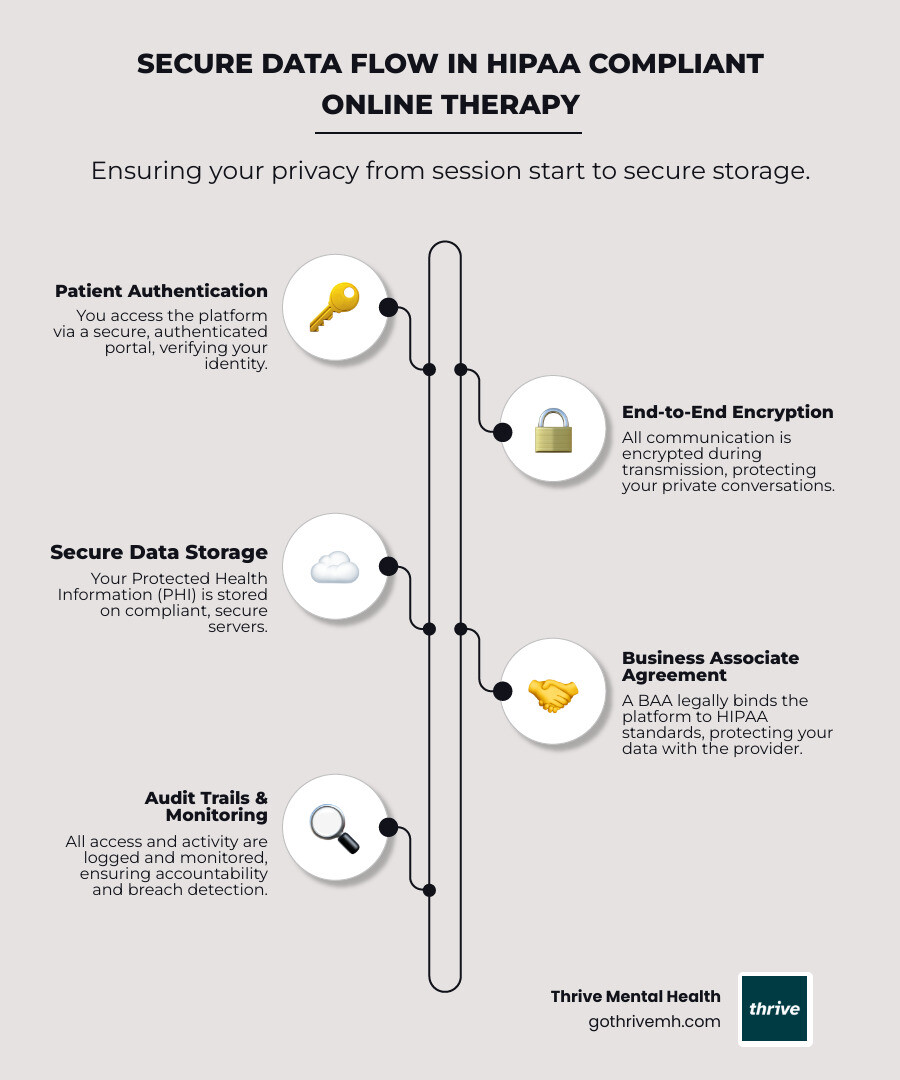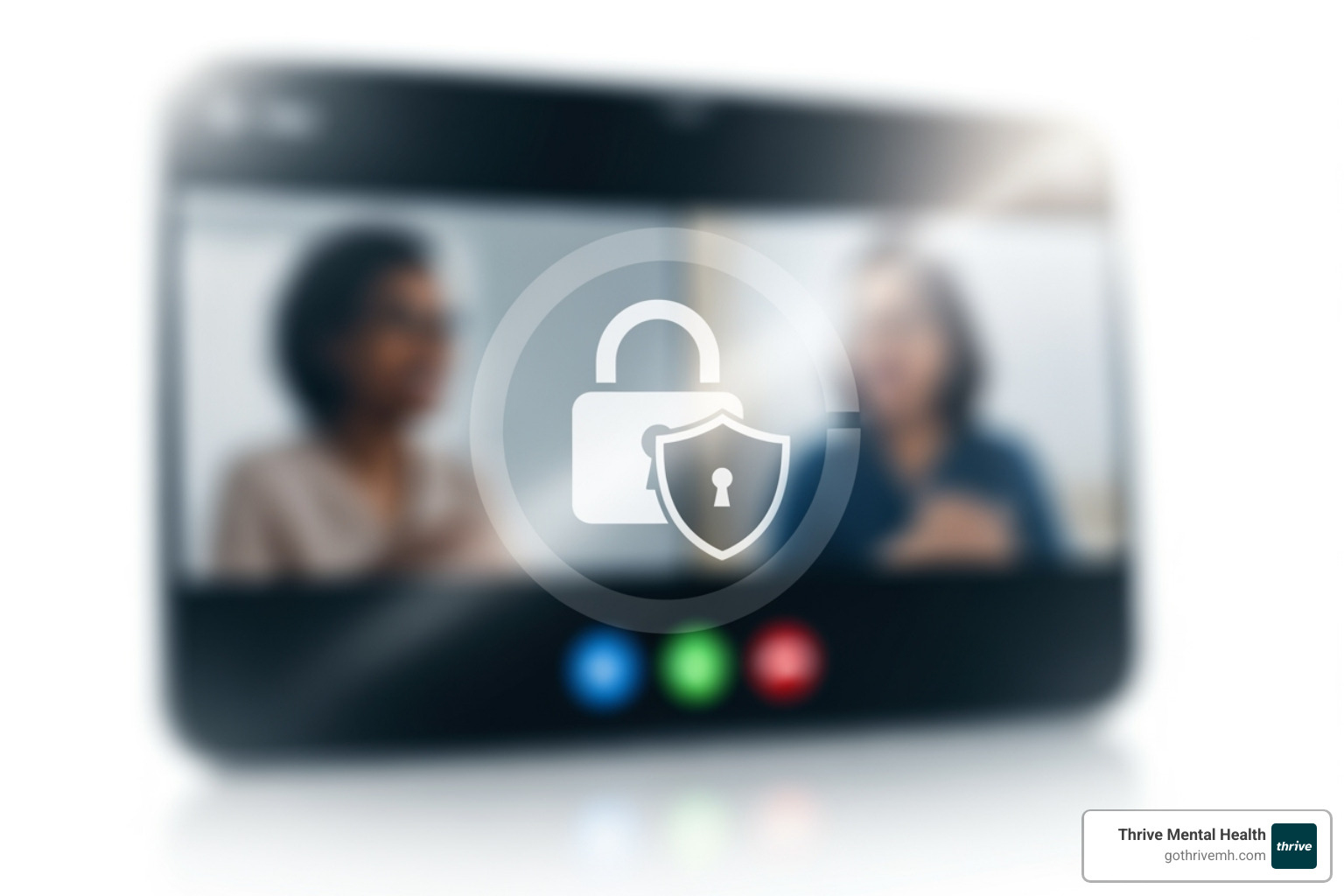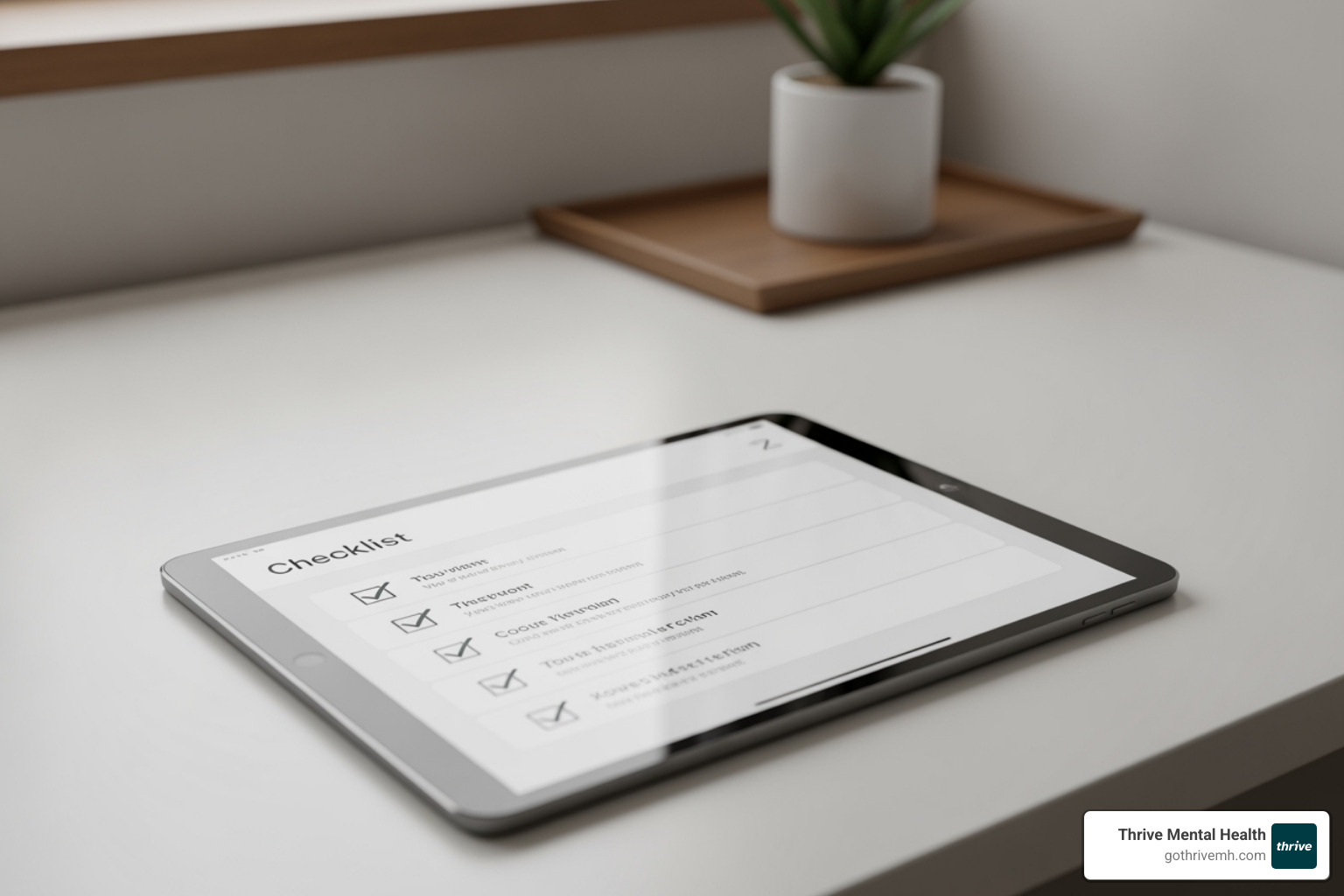Don’t Panic, It’s HIPAA Compliant! Understanding Online Therapy Security

HIPAA compliant online therapy: Secure 2025 Guide
Is Your Online Therapy Private? [The #1 Risk You’re Taking]
HIPAA compliant online therapy platforms have become essential as thousands of Floridians seek mental health support through telehealth services. Yet many people wonder: Is my private therapy session really private?
Here’s what you need to know about HIPAA compliant online therapy:
- What it means: Platforms that protect your health information with encryption, secure storage, and legal agreements
- Why it matters: Non-compliant platforms risk data breaches, identity theft, and loss of privacy
- Key features: End-to-end encryption, Business Associate Agreements (BAAs), and secure data handling
- Your rights: Access to private, confidential mental health care protected by federal law
The telehealth industry exploded during the pandemic, with over 4.3 billion minutes of telemedicine delivered through platforms like doxy.me alone. But with this growth came valid concerns about privacy and security.
The reality is stark: Using non-compliant platforms can result in fines up to $1.5 million for providers and put your most sensitive information at risk.
As Anna Green, LMHC, LPC, and Chief Clinical Officer at Thrive Mental Health, I’ve helped establish rigorous telehealth standards – including earning The Joint Commission’s telehealth accreditation. Understanding HIPAA compliant online therapy isn’t just about following rules; it’s about ensuring you can focus on healing without worrying about your privacy.

HIPAA compliant online therapy terms explained:
What Is HIPAA? (And Why It Protects Your Most Private Information)
HIPAA stands for the Health Insurance Portability and Accountability Act of 1996. Think of it as your personal bodyguard for sensitive health information – it’s a federal law that prevents your private medical details from being shared without your permission.
When you’re looking for HIPAA compliant online therapy, you’re essentially asking: Will my deepest thoughts and struggles stay between me and my therapist? The answer should always be yes.
During virtual therapy sessions, you’re sharing what’s called Protected Health Information (PHI). This isn’t just your name and phone number. PHI includes your diagnosis, treatment plans, therapy notes, session recordings (if you consent to them), and every conversation you have with your therapist about your mental health.
Without HIPAA compliance, this deeply personal information becomes vulnerable. That’s why HIPAA compliant online therapy isn’t optional – it’s the foundation that makes healing possible. After all, how can you truly open up if you’re worried about your private moments being exposed?
The trust between you and your therapist is sacred. HIPAA protects that trust by giving you legal rights over your health information. You deserve to focus on your healing journey without fear. Learn more about how virtual therapy creates a secure space for effective treatment.
The $1.5M Mistake: Risks of Using Non-Compliant Therapy Apps
The internet can be a powerful tool for healing, but it also has dark corners where your private information could end up. Using non-compliant platforms for therapy creates serious risks that go far beyond inconvenience.
Data breaches and identity theft top the list of concerns. Your personal and health information could fall into the wrong hands, leading to stolen identity or misuse of your medical records. Imagine strangers having access to your mental health history.
Blackmail and stigma represent even more frightening possibilities. Your most vulnerable moments – shared in confidence during therapy – could be used against you. This isn’t paranoia; it’s a real risk when platforms don’t follow proper security protocols.
The consequences for healthcare providers are equally severe. Legal penalties can reach up to $1,500,000 in fines for HIPAA violations. Therapists and mental health organizations also risk losing their professional licenses and facing irreparable damage to their reputation.
Most importantly, damaged patient trust undermines the very foundation of mental health care. If you can’t trust that your privacy is protected, you’ll hesitate to seek the help you need.
The 3 HIPAA Rules That Keep Your Therapy Sessions Secret
HIPAA compliant online therapy follows three essential rules that work together to protect your information.
The Privacy Rule establishes your rights over your health information. You can examine your therapy records, request copies, and ask for corrections if needed. For telehealth, this means your conversations stay confidential between you and your therapist.
The Security Rule requires specific safeguards for electronic health information. This includes administrative safeguards (like staff training), physical safeguards (secure servers), and technical safeguards (encryption and access controls). These protect your information as it travels through digital channels.
The Breach Notification Rule ensures transparency if something goes wrong. If a security incident occurs, affected patients, government agencies, and sometimes the media must be notified promptly.
Before starting online therapy, you’ll receive a Notice of Privacy Practices that explains exactly how your health information will be used and protected. Patient consent isn’t just a formality – it’s your informed agreement to participate in secure, confidential care.
These rules aren’t bureaucratic red tape. They’re your protection against a world where digital privacy is increasingly under threat.
How Secure Platforms Create a Digital Fortress for Your Data

When you’re sharing your deepest struggles with a therapist online, you deserve to know your privacy is bulletproof. HIPAA compliant online therapy isn’t just about checking boxes – it’s about building a fortress around your most sensitive information.
Think of secure telehealth like a bank vault with multiple layers of protection. Each layer serves a specific purpose, and they work together to keep your data safe. These security measures fall into three main categories that work around the clock to protect you.
Technical safeguards are the digital bodyguards of your information. They control who can access your data and keep detailed records of every interaction. Administrative safeguards are the policies and procedures that govern how your information is handled – from staff training to emergency protocols. Physical safeguards protect the actual computers and servers where your data lives, ensuring no one can physically access your information without permission.
The beauty of this multi-layered approach is that even if one safeguard fails, the others continue protecting you. It’s like having multiple locks on your front door, a security system, and a guard dog all working together.
Your Security Checklist: 6 Must-Have Technical Features
When you’re choosing a therapist or platform for online sessions, certain technical features aren’t just nice to have – they’re absolutely essential for your safety. Let me walk you through what truly matters.
End-to-end encryption is your first line of defense. This means your video call, voice, and any messages are scrambled into unreadable code the moment they leave your device. Only you and your therapist have the key to open up this code. Even if someone intercepts your data, all they’ll see is gibberish. It’s like having a conversation in a secret language that only you and your therapist understand.
Access controls ensure that only the right people can join your session. This isn’t just about passwords – it’s about creating unique digital fingerprints for each user. When your therapist logs in, the system verifies it’s really them before granting access to your session.
User authentication goes beyond simple passwords. The best platforms use multi-factor authentication, which might include something you know (a password), something you have (your phone), or something you are (your fingerprint). It’s like having multiple forms of ID to prove you’re really you.
Audit logs create an invisible paper trail of everything that happens with your data. Who accessed it? When? From where? These tamper-proof records ensure accountability and help spot any suspicious activity immediately.
Your session data needs secure storage that protects information both when it’s moving between devices and when it’s sitting on a server. Think of it as having an armored truck transport your valuables to a high-security vault.
Finally, automatic logoff protects you if you forget to close your session. After a few minutes of inactivity, the system logs you out automatically – like having a door that locks itself when you walk away.
The BAA: The One Document That Proves Your Therapy Is 100% Confidential
Here’s something that might surprise you: the most important document protecting your privacy isn’t something you sign – it’s something your therapist’s organization signs with the technology platform. It’s called a Business Associate Agreement, or BAA, and it’s your golden ticket to truly secure care.
A BAA is a legal contract that extends HIPAA’s protective umbrella from your therapist to the technology company powering your sessions. When a platform signs a BAA, they’re legally promising to protect your information with the same rigor as your healthcare provider.
This agreement isn’t just paperwork – it’s a binding commitment. The platform must safeguard your information according to HIPAA standards, use your data only for approved purposes, report any security breaches immediately, and cooperate fully with compliance audits.
Here’s the red flag you need to watch for: if a telehealth platform refuses to sign a BAA, run the other way. It means they’re not willing to take legal responsibility for protecting your most sensitive information. At Thrive Mental Health, we only work with platforms that provide comprehensive BAAs because for our clients across Florida, privacy isn’t negotiable.
You can review sample BAA provisions from HHS.gov to see exactly what these agreements cover. When a platform signs a BAA, they’re putting their reputation and legal standing on the line to protect you – and that’s exactly the level of commitment your mental health deserves.
Secure Telehealth vs. FaceTime: Why Your Video App Isn’t Safe for Therapy
It’s tempting to think any video app will work for therapy sessions. We video chat with friends and family all the time, so what’s the big deal? But here’s the reality: there’s a massive difference between catching up with your cousin on FaceTime and receiving HIPAA compliant online therapy.
Think of it this way – you wouldn’t perform surgery in your kitchen just because you have sharp knives. Similarly, standard video apps simply weren’t built to handle the sensitive nature of mental health care.
| Feature | HIPAA-Compliant Platform | Standard Video App (e.g., basic Zoom, FaceTime) |
|---|---|---|
| BAA Signed | Yes, legally binding | No, generally not offered |
| End-to-End Encryption | Yes, by default and robust | Often limited or not true E2EE for all features |
| Access Controls | Robust (user authentication, role-based access, audit logs) | Basic (password protected, but less granular controls) |
| PHI Data Storage Policy | Strict, encrypted, and HIPAA-compliant data centers | Unclear, data may be used for analytics or advertising |
| Designed for Healthcare | Yes, built with patient privacy and clinical workflows in mind | No, designed for general communication |
The differences go beyond just technical features. HIPAA-compliant platforms include specialized tools like virtual waiting rooms and integration with electronic health records – features that make your therapy experience smoother and more professional.
Why Apps Like FaceTime & Skype Put Your Privacy at Risk
Your favorite video apps work great for birthday calls with grandma, but they fall short when it comes to protecting your deepest thoughts and feelings. The terms of service for most consumer apps allow them to analyze your data for advertising purposes. Imagine ads popping up based on what you discussed in therapy – that’s not just creepy, it’s potentially harmful.
Standard apps also lack the audit trails required by HIPAA. If something goes wrong, there’s no way to track what happened to your information. They don’t store data in specialized healthcare-compliant data centers, and they won’t sign the legal agreements that hold them accountable for protecting your privacy.
Most importantly, these platforms simply weren’t designed with healthcare in mind. They’re missing the unsecure connections and specialized security features that mental health care demands. Using them for therapy puts both you and your therapist at risk for serious legal and privacy violations.
That’s exactly why we use only verified, secure platforms for all our services available to Florida residents, including our secure Virtual Intensive Outpatient Programs. Your healing journey deserves the protection that only true HIPAA compliant online therapy can provide.
Your 4-Step Checklist for Finding and Using Secure Online Therapy

Here’s the truth: you shouldn’t have to be a cybersecurity expert to get safe mental health care. But knowing what to look for can give you real peace of mind when choosing HIPAA compliant online therapy. Think of this as your detective toolkit for spotting the good platforms from the risky ones.
The power is in your hands. You have every right to ask questions about how your most personal information will be protected. Any legitimate provider will welcome these questions – in fact, they should be proud to answer them.
How to Verify a Platform Offers HIPAA Compliant Online Therapy
Start with the basics: visit the platform’s website and look for a dedicated security or HIPAA page. Legitimate telehealth companies aren’t shy about their compliance – they’ll display it prominently. If you have to dig deep or can’t find any mention of HIPAA, that’s your first red flag.
Next, ask directly for their Business Associate Agreement. This might feel awkward, but remember – this is your privacy we’re talking about. Your therapist or the platform should be able to provide a copy of their BAA without hesitation. If they seem confused by the request or can’t produce one, walk away.
Read the privacy policy – yes, I know it’s boring, but it’s worth it. Look for clear language about encryption, where your data is stored, and who can access it. A good privacy policy reads like a promise, not a legal maze designed to confuse you.
Finally, scan for security feature descriptions on their website. Do they mention end-to-end encryption? Multi-factor authentication? Secure data centers? These aren’t just fancy tech terms – they’re your digital bodyguards.
Best Practices for Protecting Your Privacy During Sessions
Even with a rock-solid HIPAA compliant online therapy platform, you play a crucial role in keeping your sessions private. Think of it as teamwork between you and the technology.
Your internet connection matters more than you might think. Always use your private, password-protected home Wi-Fi. That coffee shop Wi-Fi might be convenient, but it’s like having your therapy session in a crowded room where anyone can listen in. Public networks are a privacy nightmare waiting to happen.
Location, location, location – find a quiet, private space where you won’t be interrupted or overheard. Pop in some headphones for extra privacy. Your bedroom, home office, or even your car (if parked safely) can work great.
Stick to your own devices. Use your personal computer, tablet, or phone – never a shared or work device. Make sure it’s updated and has a strong, unique password. This isn’t just about the session itself; it’s about protecting any login credentials or session history stored on the device.
Always log out completely when your session ends. It takes two seconds but prevents anyone else who uses your device from accessing your therapy platform or session history.
Insurance and Access to HIPAA Compliant Online Therapy
In Florida, getting insurance coverage for HIPAA compliant online therapy is more accessible than ever. State laws and insurer policies have expanded access, requiring fair reimbursement for virtual care.
Major insurance plans are on board. Companies like Cigna, Optum, Aetna, and Florida Blue (BCBS) routinely cover telehealth, often with the same copay as an in-person visit. This means you can access secure, high-quality therapy without worrying about surprise costs.
What started as a pandemic necessity is now a permanent, accessible benefit for millions of Floridians seeking mental health support.
The best part? You can check your Virtual IOP Insurance coverage in just a few minutes to see exactly what your plan covers. No surprises, no hidden costs—just clear information to help you make the best choice for your mental health journey.
HIPAA Compliant Online Therapy: Your Questions Answered
When it comes to HIPAA compliant online therapy, you probably have questions. That’s completely normal – after all, you’re trusting someone with your most personal thoughts and feelings. Here are concise answers to the most common concerns.
What makes an online therapy platform HIPAA compliant?
A platform is HIPAA compliant if it uses technical safeguards like end-to-end encryption, has administrative policies for data protection, and signs a Business Associate Agreement (BAA). The BAA is a legal contract that holds the platform accountable for protecting your health information.
Can my therapist use FaceTime or Zoom for our sessions?
No, standard consumer apps like FaceTime, Skype, or the free version of Zoom are not HIPAA compliant. They lack the required security features and won’t sign a BAA. However, special versions like Zoom for Healthcare are compliant and safe to use.
How do I know if my therapy is actually private?
Ask your provider directly what platform they use and if they have a signed BAA. They should also provide you with a “Notice of Privacy Practices” that explains how your data is protected. A trustworthy therapist will be transparent about their security measures.
Does insurance cover HIPAA compliant online therapy?
Yes, most major insurance plans accepted in Florida—including Cigna, Optum, Aetna, and Florida Blue—now cover virtual therapy just like in-person sessions. You can often get secure, compliant care with a low or even $0 copay.
Ready for Secure Therapy? Here’s Your Next Step
Your mental health journey deserves the strongest possible foundation—and that foundation is HIPAA compliant online therapy. When you understand how your personal information is protected, you can focus entirely on what matters most: your healing and growth.
Think about it: how can you truly open up in therapy if you’re worried about your deepest thoughts ending up in the wrong hands? The peace of mind that comes with knowing your sessions are completely secure isn’t just nice to have—it’s essential for effective treatment.
HIPAA compliance is the foundation of trust in remote mental health support. It’s not just about following rules or checking boxes. It’s about creating a safe space where you can be completely vulnerable without fear.
You have the right to private, secure care. Full stop. Choosing a compliant provider isn’t just the smart choice—it’s the only choice that truly respects your privacy and your healing process.
At Thrive Mental Health, we’ve built our entire virtual platform for Florida residents around this principle. We handle all the technical complexities, security protocols, and legal requirements so you never have to worry about them. Our commitment to HIPAA compliant online therapy means every conversation, every breakthrough, and every vulnerable moment stays exactly where it belongs: between you and your therapist.
Ready for support? Thrive offers virtual and hybrid IOP/PHP in Florida with evening options. Verify your insurance in 2 minutes (no obligation) → Start benefits check or call 561-203-6085. If you’re in crisis, call/text 988.